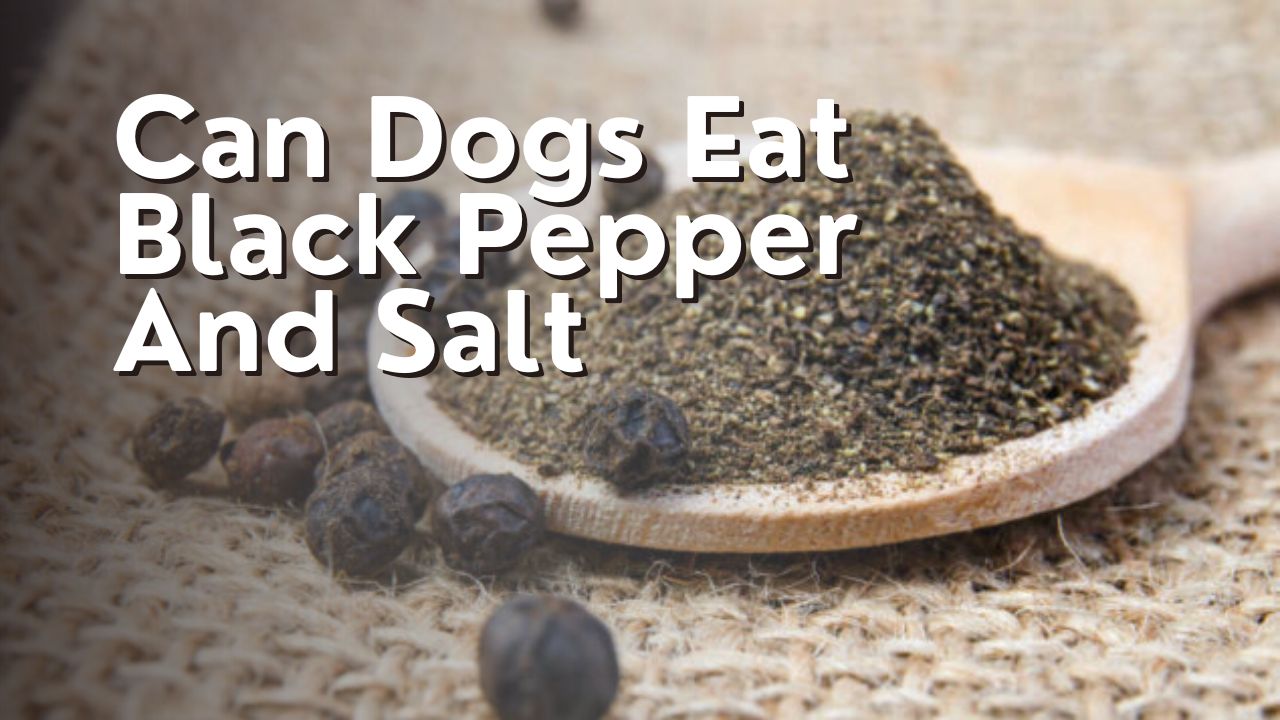Hey there! Have you ever wondered if your furry friend can enjoy some of the seasonings we humans love? Well, today I want to talk about something that has crossed my mind many times: can dogs eat black pepper and salt?
We all want to treat our dogs to something special every now and then, but it’s important to know what’s safe for them to consume. In this article, we’ll explore the potential risks of black pepper and salt for dogs, as well as some safe alternatives that can add flavor to their meals.
We’ll also touch on the benefits of a balanced diet for our four-legged pals and the importance of consulting with a veterinarian when it comes to their nutrition. So, let’s dive in and make informed choices for our furry friends’ diets!
The Potential Risks of Black Pepper and Salt for Dogs
Now, let’s talk about the potential risks of giving your furry friend a taste of black pepper and salt.
While black pepper and salt may seem harmless to us, they can actually be quite dangerous for dogs. Both black pepper and salt contain substances that can be toxic to dogs in large amounts.
For example, black pepper contains a compound called piperine, which can irritate a dog’s digestive system and cause stomach upset or even diarrhea.
Additionally, too much salt can lead to sodium ion poisoning in dogs. This can cause symptoms like vomiting, diarrhea, excessive thirst, and in severe cases, seizures or even death.
It’s important to remember that dogs have different digestive systems than humans, and what may be safe for us to consume may not be safe for them. So, it’s best to avoid giving your dog any foods that contain black pepper or salt.
If you suspect that your dog has ingested black pepper or salt, it’s important to contact your veterinarian immediately for guidance.

Safe Alternatives to Black Pepper and Salt for Dogs
Try exploring some safe and flavorful options that’ll keep your furry friend healthy and satisfied. When seasoning your dog’s food, it’s important to avoid black pepper and salt, as they can be harmful. Instead, consider these safe alternatives:
- Turmeric: This spice adds vibrant color and numerous health benefits. It has anti-inflammatory properties and aids digestion.
- Cinnamon: A sprinkle of cinnamon adds a sweet and warming flavor. It has antioxidant properties and regulates blood sugar levels.
- Parsley: Not only freshens breath, but also contains vitamins and minerals. It can be chopped and added to their food for freshness.
- Ginger: Adding a small amount of ginger helps with digestion and relieves nausea. It also has anti-inflammatory properties.
Remember, moderation is key when introducing new flavors. Always consult with your vet before making changes. By incorporating these alternatives, you can enhance your dog’s meals while keeping them healthy and happy.
The Benefits of a Balanced Diet for Dogs
Discover the incredible advantages your furry companion can experience when they indulge in a well-balanced diet. A balanced diet is essential for dogs as it provides them with the necessary nutrients to support their overall health and well-being.
By feeding your dog a variety of high-quality proteins, carbohydrates, fats, vitamins, and minerals, you can ensure that they receive all the essential nutrients they need to thrive.
One of the main benefits of a balanced diet for dogs is improved digestion. When dogs consume a well-balanced diet, their digestive system functions optimally, leading to better nutrient absorption and fewer digestive issues such as diarrhea or constipation. Additionally, a balanced diet can help maintain a healthy weight in dogs, which is crucial for preventing obesity-related health problems.
Furthermore, a balanced diet promotes a strong immune system in dogs. The nutrients found in a well-balanced diet, such as vitamins and antioxidants, can help support their immune system, making them less susceptible to illnesses and infections.
In conclusion, providing your dog with a well-balanced diet is essential for their overall health and well-being. It can improve digestion, help maintain a healthy weight, and promote a strong immune system. So, be sure to consult with your veterinarian to determine the best diet plan for your furry friend and give them the gift of a balanced diet.
Consulting with a Veterinarian
When it comes to consulting with a veterinarian about a balanced diet for your dog, there are a few key points to consider.
Firstly, the individual needs and considerations of your dog should be taken into account, as every dog is unique.
Secondly, seeking professional guidance is essential to ensure that your dog is receiving proper nutrition and to address any specific dietary concerns.
Lastly, a veterinarian can provide expert advice on feeding schedules, portion sizes, and the best types of food for your dog’s overall health and well-being.
Individual Dog Considerations
Remember to take into account your individual dog’s health and dietary restrictions before feeding them black pepper or salt. Each dog is unique and may have different sensitivities or allergies. Some dogs may have gastrointestinal issues or kidney problems that can be worsened by consuming these spices. It is always best to consult with your veterinarian before making any changes to your dog’s diet. They will be able to provide personalized advice based on your dog’s specific needs.
| Spices | Effect on Dogs | |
|---|---|---|
| 1 | Black Pepper | Can cause stomach irritation and upset |
| 2 | Salt | Can lead to excessive thirst and sodium toxicity |
| 3 | Garlic | Toxic to dogs and can cause anemia |
| 4 | Onion | Toxic to dogs and can damage red blood cells |
By understanding your dog’s individual health conditions and consulting with a veterinarian, you can ensure that their diet is appropriate and safe for their well-being.
Professional Guidance for Feeding
For expert advice on feeding your furry friend, it is recommended to consult a professional veterinarian. Veterinarians have extensive knowledge and experience in animal nutrition. They can provide specific guidance tailored to your dog’s individual needs. They will assess your dog’s overall health, age, breed, and any existing medical conditions to determine the most appropriate diet.
When it comes to feeding dogs, it is important to consider the potential risks associated with certain foods. For example, black pepper and salt should be given in moderation. While small amounts of black pepper and salt may not be harmful to dogs, excessive consumption can lead to digestive issues, dehydration, and even toxicity.
To ensure the well-being of your dog, it is best to follow the advice of a veterinarian. Avoid feeding your dog excessive amounts of black pepper and salt to prevent any potential harm.

Conclusion: Making Informed Choices for Your Dog’s Diet
To make informed choices for your dog’s diet, it’s important to consider whether dogs can safely consume black pepper and salt. After conducting extensive research and consulting with professionals, I have come to a conclusion.
While small amounts of black pepper are generally safe for dogs, it is best to avoid giving them salt altogether.
Black pepper, when used in moderation, can provide some health benefits for dogs. It has been known to aid in digestion and provide relief from gas and bloating. However, it is crucial to remember that excessive amounts can cause stomach upset and may even be toxic to dogs. Therefore, it’s important to use black pepper sparingly and only as a flavor enhancer in their meals.
On the other hand, salt should be strictly avoided in your dog’s diet. Dogs have different sodium requirements than humans, and excessive salt intake can lead to dehydration, electrolyte imbalances, and even kidney damage. It is always best to stick to a balanced and nutritionally complete diet for your furry friend, without the need for added salt.
In conclusion, while black pepper can be given to dogs in small amounts, it’s best to avoid giving them salt altogether. Always consult with your veterinarian for specific dietary recommendations for your dog, and remember that moderation is key when introducing new foods into their diet.
Frequently Asked Questions
Can dogs consume other spices besides black pepper and salt?
Yes, dogs can consume other spices besides black pepper and salt. However, it’s important to research and consult with a vet to ensure the spices are safe and won’t cause any health issues for your furry friend.
What are some signs that my dog may be experiencing an adverse reaction to black pepper or salt?
If your dog is experiencing an adverse reaction to black pepper or salt, some signs to look out for include vomiting, diarrhea, excessive drooling, abdominal pain, restlessness, and difficulty breathing.
Are there any specific dog breeds that are more susceptible to the potential risks of black pepper and salt?
Some dog breeds may be more susceptible to the potential risks of black pepper and salt. It’s important to be cautious and monitor any adverse reactions in your dog, regardless of their breed.
Can I feed my dog homemade meals without using black pepper or salt?
Yes, I can definitely feed my dog homemade meals without using black pepper or salt. There are plenty of other dog-friendly seasonings and herbs that can add flavor to their food.
Is it safe to use black pepper or salt as a topical treatment for my dog’s skin conditions?
It is not recommended to use black pepper or salt as a topical treatment for a dog’s skin conditions. Consult with a veterinarian to explore safe and effective options for your dog’s skin health.
Conclusion
In conclusion, it’s important to be cautious when it comes to feeding your dog black pepper and salt. While small amounts may not be harmful, excessive consumption can lead to health issues.
It is always best to opt for safe alternatives and maintain a balanced diet for your furry friend. Consulting with a veterinarian is key in making informed choices for your dog’s diet.
Remember, their well-being should always be our top priority.


